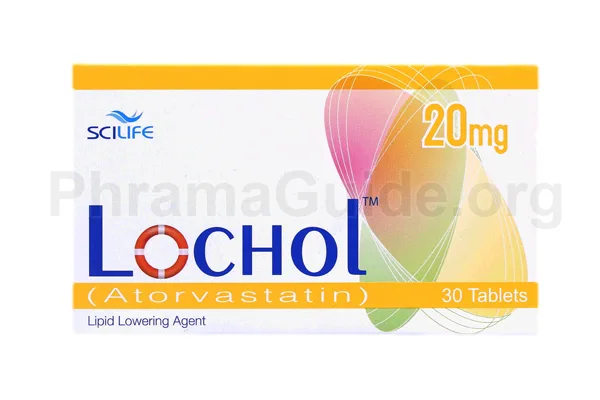Lochol is a medication used to lower cholesterol levels and reduce the risk of heart-related conditions. Like many medications, it can have side effects, though not everyone experiences them. Here are some common and less common side effects of Lochol include:
Common Side Effects
- Muscle pain or weakness: Some people may experience mild to severe muscle pain or weakness while taking Lochol, which could be a sign of a rare but serious side effect called rhabdomyolysis.
- Digestive issues: This might include nausea, diarrhea, constipation, or stomach pain.
- Headache: Some individuals may experience headaches as a side effect of Lochol.
- Joint pain: Pain or stiffness in joints can occur, though it’s not as common as muscle-related issues.
- Nasal congestion: Some individuals might experience Lochol using a runny or congested nose.
- Increased blood sugar levels: Lochol might lead to an increase in blood sugar levels, particularly in people who are at risk of or have diabetes.
- Liver function abnormalities: In rare cases, Lochol might cause an increase in liver enzymes, though serious liver problems are very rare.
- Allergic reactions: Although common, some people may experience allergic reactions such as rash, itching, swelling, dizziness, or difficulty breathing.
Less Common Side Effects
- Sleep disturbances: Some individuals may experience difficulty sleeping (insomnia) or unusual dreams while taking Lochol.
- Memory loss or confusion: There have been rare reports of memory loss or confusion associated with Lochol use, though the link is not well-established.
- Peripheral neuropathy: This refers to nerve damage that causes tingling, numbness, or pain in the hands and feet. It’s a rare side effect but has been reported in some cases.
- Visual disturbances: Lochol may cause changes in vision or blurred vision in some individuals.
- Hair loss: While not very common, some people might experience hair thinning or hair loss while taking Lochol.
- Pancreatitis: In very rare cases, Lochol has been associated with pancreatitis, which is inflammation of the pancreas. Symptoms include severe abdominal pain, nausea, and vomiting.
- Hypersensitivity reactions: Some individuals may experience severe allergic reactions beyond the more common mild allergic reactions. These reactions can be serious and may include symptoms like difficulty breathing, swelling of the face, throat, or tongue, and severe skin reactions.

What is Lochol?
Lochol is one of the leading brands of Atorvastatin, manufactured and marketed by Scilife Pharmaceuticals (Pvt) Ltd, Pakistan.
Lochol : Available Formulations and Strengths
Presently, Lochol is available in Tablets Form with the following strengths.
Lochol Tablets : 10mg, 20mg, and 40mg strengths
What Are The Possible Drug Interactions of Lochol?
- Other cholesterol-lowering medications: Combining Lochol with other cholesterol-lowering drugs, such as fibrates (gemfibrozil, fenofibrate) or niacin, can increase the risk of muscle-related side effects, including the rare but serious condition rhabdomyolysis.
- Certain antibiotics and antifungals: Some antibiotics (like erythromycin, and clarithromycin) and antifungal medications (like itraconazole, and ketoconazole) can increase the levels of Lochol in the blood, raising the risk of side effects.
- Certain heart medications: Drugs like amiodarone, diltiazem, and verapamil used for heart conditions can increase Lochol levels in the blood, leading to an increased risk of side effects.
- Grapefruit and grapefruit juice: Grapefruit and its juice can interfere with the breakdown of Lochol in the body, leading to increased levels of the drug and potentially increasing the risk of side effects. It’s advisable to avoid consuming grapefruit or its juice while taking Lochol.
- Some psychiatric medications: Certain psychiatric medications like certain antidepressants (such as nefazodone) or antipsychotics might interact with Lochol, increasing the risk of muscle-related side effects.
- Blood thinners: Combining Lochol with certain blood thinners like warfarin might increase the risk of bleeding complications.
- Cyclosporine: Taking Lochol with cyclosporine (an immunosuppressant) can increase the levels of Lochol in the blood, leading to an increased risk of side effects.

Leave A Comment